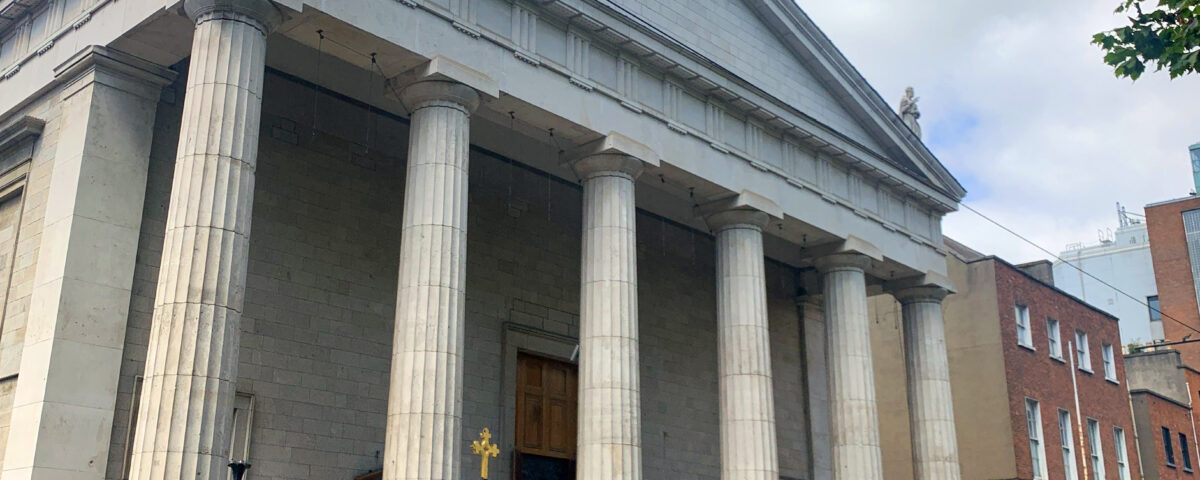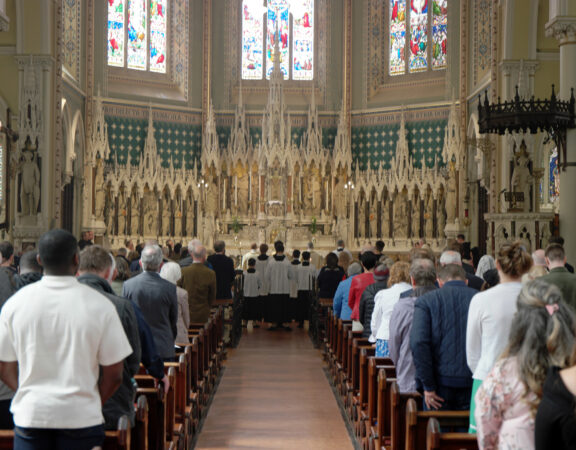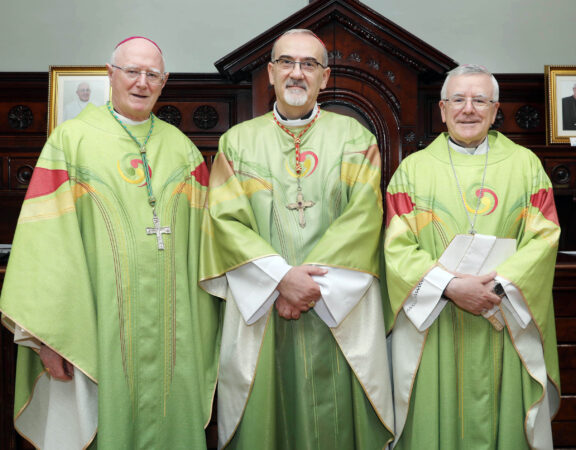Mass for the Priests of the Archdiocese deceased since November 2022
Homily of Archbishop Dermot Farrell
St Mary’s Pro-Cathedral, Dublin, November 11, 2023
Wanting to See Jesus
In today’s Gospel some Greeks who have come up to Jerusalem for the Passover seek out Jesus. They ask an interesting question: they ask if they can see Jesus. For John, there’s “seeing” and “seeing.” ‘Seeing” is much more than “looking at.” “The word became flesh and dwelt among us, and we saw his glory…” it says in the Prologue. “Where do you abide? asked the disciples of Jesus. “Come and see” was his response. The Samaritan woman at the well, after her feisty exchange with Jesus says to her neighbours, “Come and see the man who told me all that I ever did.” (4:28) Later, Jesus will say, “whoever sees me sees the One who sent me…” and again “Whoever has seen me has seen the Father…” (14:9) At the end of the Gospel, when his companions tell Thomas that they have seen the Lord, Thomas responds, “Unless I see in his hands the print of the nails …” (20:25) … Unless I see… To “see” Jesus is to draw close to him. Wanting to see Jesus, desiring to see Jesus is the beginning of the journey of following him.
It is no different for us! There isn’t a person at this Mass this morning, who does not want to follow Jesus. In the language of St John, there isn’t one of us here who does not want to see Jesus. There isn’t one of us here who does not want to cross that threshold! The question then becomes, how do we see Jesus. There are many ways—we see him in others, we glimpse him deep within ourselves, we see him in his mercy, his compassion, his acceptance of us in our brokenness and fragility. But this morning, let us permit St John, from whom we have taken this question, to give us some guidance. Let us follow in the footsteps of Jesus’ response to Philip …
Unless a Grain of Wheat Falls on the Ground…
Jesus’s first words are,
- ‘The hour has come for the Son of Man to be glorified. (12:23)
There is no real true seeing of Jesus, without seeing his glory. For John, to see Jesus glorified is to see Jesus crucified. To see Jesus on the cross. John does not have to describe the horror of crucifixion for his hearers.
- …unless a grain of wheat falls into the earth and dies, it remains a single grain. (12:24)
The cross is not just something that happens to Jesus. No! The cross is something that happens to us. It is about how we live and for what we live. It is about how we die, and what we die for, for whom we die. Unless a grain of wheat falls into the earth and dies, it remains alone. But if it dies, it yields a rich harvest. (12:24)
- Anyone who loves their life loses it; and anyone who hates their life in this world will keep it for eternal life.” (12:25)
This is not the way of the world. Not only on the cross, but on his journey to the cross, in the journey of his ministry, Jesus is progressively stripped of everything. He is emptied of everything. This is God’s way to life. This is the scandal of God’s way, the paradox of the God’s journey to life, which takes flesh in Jesus, and dwells among us. Here is the liberation Christ offers us: as we pray in the Memorial Acclamation, “Save us, Saviour of the world, for by your Cross and Resurrection you have set us free.”
Mission and Priesthood in a New Time
As beautiful as these words and expressions are, they are strange and disconnected from the lives of the vast majority of our people. If we are honest, they may frequently make little real sense for our lives too! They can be so disconnected that they neither nourish nor renew people’s faith. Even more, they will not evoke that desire we see in the Greeks of today’s Gospel: they will not evoke the desire “to see Jesus.” In this time of change, it is therefore imperative that we seek ways of speaking of our faith and our hope that—in the words of the recent Synod declaration—are “more accessible to the faithful and more embodied in the diversity of” people’s experience?
Our ministerial situation is quite different to that of those whom we remember in this Mass. Truth be told, that ministerial—and existential—difference is not going to diminish. In fact, the contrast with recent decades is going to sharpen. That does not mean that priesthood is going to be less necessary or less fulfilling, but it is going to be different. It is going to change.
This change, however, is not just about how we approach others—a missio ad extra, as it were; it is also a missio ad intra, ad nos—a journey to ourselves. As priests we need to ask ourselves some basic questions about priesthood and priestly ministry today.
First of all, we might need to ask, how we can see priesthood in such a way that we are at home again in the ordinary life of the faithful? How can we re-imaging who and what we are? If we are honest—and this is part of our pain—priesthood is no longer part of the life of the Church in the way it once was. However, we cannot return to the past. We have to discover anew what it means to be a priest in the world today.
We might need to ask, how we can move beyond our essential sacramental ministry to what the recent Synod called “ministry to those living in poverty and those who are in need in the community”? This profound question demands a response that is deeper than some of the facile solutions often advocated!
Further, it is not just ministry to those on the margins that we have look at anew, but also we may need to reimagine what sacramental ministry means? For example, would we ourselves, and our people not benefit greatly from approaching the Eucharist along the lines of what Pope Francis says: seeing the Eucharist not just as a reward, but—even more—as a source of healing. In other words, returning to Good News about the Bread that comes from Christ himself—that the Eucharist is the very Bread of Life, as Christ is the Bread of Life (see John 6:35). That is not to say that is an easy undertaking, but it surely a vital and worthy one.
Renewing our Vision of the Eucharist
When I listen to Pope Francis speak of the Eucharist, I am moved by the freshness, vitality, simplicity, and—in a sense—the ordinariness of his eucharistic spirituality. I can hear in it the faith which inspired me to priesthood, but expressed with a newness, in a new key as it were. In August 2017, he would tell the participants in Italy’s National Liturgical Week,
- ‘the Eucharist is not a sacrament ‘for me’; it is the sacrament of the many, who form one body, God’s holy and faithful people’
We too know this. We can no longer afford to be in the era of “my Mass.” It never made sense, but in days of priests in abundance and Masses in abundance, we did lose sight of something.
For Francis,
- In the Eucharist the Lord makes us walk on his road—that of service, of sharing. (Homily for Corpus Christi, 2013)
Is this not the Mass that will call us, carry us, nourish us? Must we not come to look at things in a new way, or in a renewed way? This will require that we learn to listen to each other, and to our people, anew.
The real presence of Christ was never a static presence, but a dynamic presence: “I am the LIVING Bread which has come down from heaven.” (John 6:51). In the Eucharist, we are moved by Jesus, and we move with Jesus. To cite Pope Francis one last time:
- In the Eucharist Jesus… draws alongside us, pilgrims in history, to nourish the faith, hope and charity [already] within us; to comfort us in trials, to sustain us in the commitment to justice and peace. (Angelus, June 18, 2017)
As in faithfulness and with genuine affection, we remember our brothers whom the Father has called from this life unto himself, may the Lord keep them and us ever in his love, so that his Spirit of life may transform them and us into the likeness of God’s Son, who conquered darkness and death. It is your face, O Lord that we seek; hide not your face. (Psalm 27:8)
+Dermot Farrell,
Archbishop of Dublin







